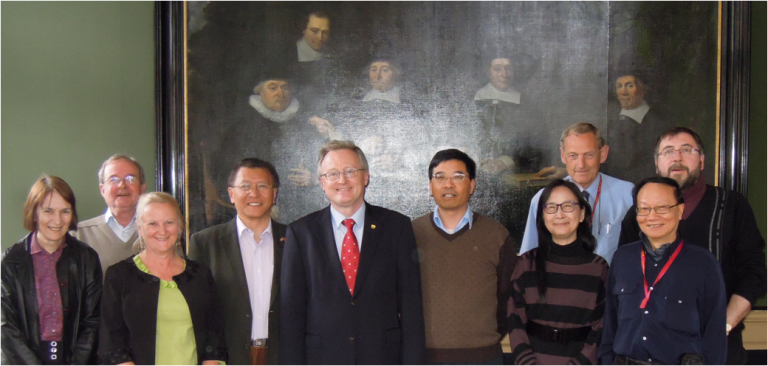New association for good practice in Chinese medicine research
On April 16, 2012, the Good Practice in Traditional Chinese Medicine (GP-TCM) Research Association was officially launched at the GP-TCM Congress in Leiden, the Netherlands.
GP-TCM is the EU’s first coordination action dedicated to traditional Chinese medicine (TCM) research. Funded by the European Commission under its 7th Framework Programme (FP7), the project has engaged more than 200 scientists and clinicians from 112 institutions in 24 countries in discussions on good practice issues related to various aspects of Chinese herbal medicine and acupuncture research, leading to state-of-the-art reports and guidelines published in Journal of Ethnopharmacology as an open-access special issue.
These guidelines need dissemination, validation and further development through continued interregional, interdisciplinary and intersectoral collaborations. To promote this, a new international association has been established to succeed the 3-year fixed term FP7 GP-TCM consortium. Twelve eminent scientists from seven countries and regions have been elected to form the Board of Directors (BoD), which is led by Founding President Professor Rudolf Bauer, University of Graz, Austria.
“We believe that the challenges of TCM research can only be solved in an interdisciplinary network, using the most advanced methodologies of the post- genomic era. The expertise of the FP7 GP-TCM consortium and the ideas of new members will enable us to develop and implement good practice in TCM research and to develop TCM in an integrative manner”, says Professor Bauer.
Dr. Tai-Ping Fan, University of Cambridge, UK, Secretary-General of the Association, explains: “We are now in the process of registering the Association as a not-for-profit organisation to fulfil the following 10 major objectives:
1. Perpetuate the interactive network established by the FP7 GP-TCM consortium;
2. Promote discussion and implementation of good practice in TCM research and development, including the use of sustainably sourced materials;
3. Advocate high-quality evidence-based research and development on TCM as well as on its integration with conventional medicine;
4. Organise and co-organise scientific meetings;
5. Nurture young TCM researchers at different levels in an interdisciplinary approach, including BSc, MSc, PhD and post-doctoral programmes;
6. Facilitate collaborations and sharing of resources, expertise and good practice among members, industry and regulatory agencies;
7. Encourage collaborations with existing relevant societies, consortia and organisations;
8. Strengthen interdisciplinary, interregional, and intersectoral collaborations in TCM research and development;
9. Perpetuate good practice in publishing TCM research outcomes;
10. Disseminate scientific research outcomes and latest developments in regulatory sciences to stakeholders, industry, professional groups and the public”.
Professor Peter Hylands, King’s College London, UK, Treasurer of the Association, adds: “Thanks to successful fundraising efforts, we are pleased that we are in a position to offer free membership for the year of 2012 to all existing members, as well as qualified scientists, clinicians and students”.
Professor De-an Guo, Chinese Academy of Sciences, China, President-elect of the Association continues: “Indeed, membership of the Association is open to all those who are interested in the objectives of the Association and we are looking forward to fruitful international collaborations in an epic effort to deliver the above objectives”.
“Founding the GP-TCM Research Association dedicated to promoting high-quality evidence-based TCM research through developing, disseminating and implementing good practice is one of the most important milestones of the FP7 GP-TCM consortium and will prove to be a critical step towards sustainable development of TCM research worldwide”, concludes Dr. Qihe Xu, King’s College London, Coordinator of the FP7 GP-TCM consortium.
Links:
1. The GP-TCM Research Association: http://project.gp-tcm.org/association/
2. The FP7 GP-TCM Project: http://project.gp-tcm.org/
3. The open-access GP-TCM Journal of Ethnopharmacology special issue: http://project.gp-tcm.org/2012/03/the-gp-tcm-j-ethnopharmacol-special-issue/

Board of Directors Prof. Monique Simmonds, Prof. Peter Hylands (Treasurer), Prof. Nicola Robinson, Dr. Tai-Ping Fan (Secretary-General), Prof. Rudolf Bauer (President), Dr. Qihe Xu (Deputy Secretary-General), Prof. Vivan Wong, Prof. Rob Verpoorte, Prof. Kelvin Chan and Prof. Pierre Duez met on 15th April in Leiden, the Netherlands.


